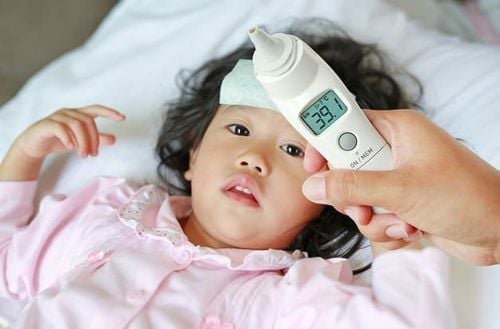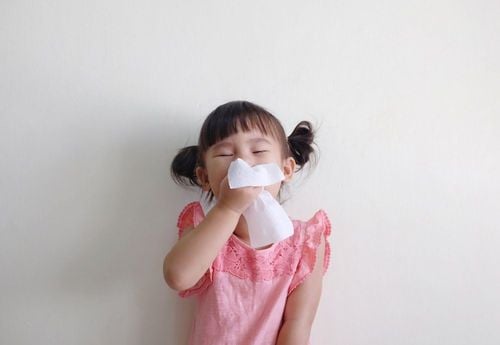This is an automatically translated article.
Children often get sick, causing many parents to worry and worry. Especially, at the time of season change, the weather changes from hot to cold, high humidity... leading to a high rate of children suffering from diseases related to respiratory and digestive tract infections.1. The reason why children often get sick
A child is said to be prone to minor illnesses if the child is sick almost every month and requires regular medication. You may think that this condition is due to the child's body, but in fact, there are causes. The reasons why children often get sick are:The child's immune system is still weak and incomplete: After birth, babies always receive a certain amount of immune antibodies from the mother through milk (passive immune system). . During development, a child's immune system gradually matures. Therefore, at this stage, children are quite sensitive to external conditions and have poor endurance. When the child's body is immature and weak, the child is very susceptible to diseases. Parents can choose to vaccinate their children to increase the immunity and resistance of children, but only immune to certain diseases, not all diseases. Impaired Immune System: This is a state in which the body does not produce an immune response or has a weak immune response, unable to respond to normal life requirements. At that time, the child's body is not able to fight off disease-causing microorganisms. This can be caused by congenital (primary immunodeficiency) or acquired (secondary) immunodeficiency that causes immune cells to no longer respond to antigens. in the body anymore. The digestive system of children is not yet developed: The intestinal microbiota of newborns is not yet complete, the digestive enzymes are also incomplete in quantity and quality, creating great obstacles for the digestion of food. children, especially those who are anorexic and have inadequate nutrition. Parents need to have a specific plan for their child's diet. In addition, children should not be forced to eat, making them afraid to eat, thereby not being provided with enough nutrients needed for development. Failure to properly wash hands: Children's hands are easily contaminated because they love to play or have a habit of putting their hands in their mouths. Therefore, if parents do not pay attention to help children maintain proper hand hygiene, it can make children more likely to get diseases related to the respiratory tract, flu, hand, foot and mouth disease or diarrhea caused by rotavirus.. In addition, parents who do not wash their hands with soap before feeding or breastfeeding will also make children sick. Use of drugs: There are many types of drugs that are contraindicated for use in children or different ages. Therefore, when children are sick, using drugs, especially antibiotics, may not be good for them at all. Because it can cause an imbalance of intestinal bacteria, making the child's digestive system poor.

Trẻ hay ốm vặt khiến cha mẹ lo lắng
2. The phenomenon of children with repeated fevers and causes
Usually, children only have a fever for a few days and can recover immediately, the body can also be healthy again and after a while, this phenomenon can reappear. This is also considered a normal expression of the child, so parents only need to take care of the child carefully.However, if the child's fever persists, with many times without remission, parents cannot be subjective with this. Because, when a child has a fever with repeated fevers or has recurrent fevers and fevers in episodes with a short period of time, the child's body at this time may be affected very clearly. This condition requires the child to see a pediatrician so that the specific health status of the child can be reviewed.
Possible causes of recurrence of fever or continuous fever in children may be due to:
Infection: The disease is formed by the attack of viruses and bacteria in the body as a protective barrier of the system. The immune system in the child's body is not strong enough to fight this army. Or there are cases of children with repeated fevers related to tuberculosis. The signs of this symptom can be seen as a dry cough and a continuous cough, which seriously affects the health of the child. During the time the child is sick, parents also find that the child loses weight rapidly, the body is tired ... Therefore, please take the child to see a doctor for appropriate treatment. Non-infectious diseases: In the case of children with repeated fevers, fever not only appears when the child's body is infected with a virus or bacteria, but can also be caused by autoimmune diseases or other diseases. Illnesses that can cause a child to have a persistent fever that is not caused by an infection include acute arthritis, systemic lupus erythematosus... When a child has a fever continuously for a long time, parents should take steps to help their child can reduce fever and avoid danger to children's health as follows:
Wipe the young person with warm water: One of the simple and effective ways to reduce fever applied by many people is to wipe the child's body with warm water to do this. body cool. Parents can use a soft and clean towel, moistened with warm water and wipe on the child's body parts, especially in the armpits, groin, neck and every 2-3 hours. If parents persist in doing this, the child's fever will also be reduced. Wear loose and airy clothes for the child: When the child has a fever many times, parents should let the child wear loose and airy clothes. To help lower the child's body temperature. However, parents need to pay attention to using soft towels to absorb sweat to avoid the situation of sweat percolating back, causing colds for children. Give your child plenty of water to drink: When a child has a high fever, the body is dehydrated, the child will feel tired, sluggish... To make the baby feel comfortable and comfortable, parents should increase the amount of water for the baby to help rehydrate. and quench your baby's thirst

Trẻ hay ốm vặt phải làm sao là thắc mắc của nhiều bậc phụ huynh
3. Some ways to help improve the situation of sick children coming back again and again
"What to do with sick children" is the worry and question of parents. In order to improve the condition of minor illnesses, caregivers need to strengthen the child's resistance as well as prevent illness. Specifically:Strengthening the child's natural resistance by strengthening the gastrointestinal immune system, because 70 to 80% of the body's immune system produces IgA located in the intestines, helping the child's digestive tract healthy, maximum absorption of nutrients. Create favorable conditions for children to have delicious meals to help them gain weight according to standards. In case of suspecting that the child has congenital or acquired immunodeficiency, parents should take the child to a doctor for timely diagnosis and treatment. Parents can add necessary micronutrients for children such as vitamins and amino acids necessary for children to quickly recover from illness. Children need to add necessary micronutrients such as: Zinc, selenium, chromium, vitamins B1 and B6, Ginger, acerola fruit extract (vitamin C), ... to improve taste, eat well, gain height and weight right and beyond the standard, good immune system, enhanced resistance to less sickness and less digestive problems.
The improvement of symptoms can take place for a long time, so it is recommended that parents be calm and persistent when supplementing with nutrients for children, even through eating or functional foods. In particular, the use of functional foods should choose those of natural origin that are easily absorbed, do not allow simultaneous use of many types or continuously change the types of functional foods.
For more nutritional knowledge and child care for each age, parents should regularly visit the website vimec.com and make an appointment with the leading doctors, pediatric and nutrition experts of the National General Hospital. Vinmec when needing advice on children's health.













